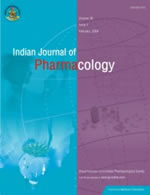
|
Indian Journal of Pharmacology
Medknow Publications on behalf of Indian Pharmacological Society
ISSN: 0253-7613 EISSN: 1998-3751
Vol. 37, Num. 4, 2005, pp. 270-270
|
Indian Journal of Pharmacology, Vol. 37, No. 4, July-August, 2005, pp. 270
CD Review
CD Review
Shankar P. Ravi
Department of Pharmacology, Manipal College of Medical Sciences, P.O.Box 155, Deep Heights, Pokhara
Correspondence Address: Department of Pharmacology, Manipal College of
Medical Sciences, P.O.Box 155, Deep Heights, Pokhara, pathiyilravi@gmail.com
Code Number: ph05073
WHO Medicines Bookshelf Version 4.0: World Health Organization, 2004 by World Health Organization. Released by WHO, Avenue Appia 20, CH-1211 Geneva 27, Switzerland. E-mail: edmdoccentre@who.int; Web site: http://www.who.int/medicines. ISBN 924 1591 85 4.
The WHO Medicines Bookshelf Version 4.0 contains a selection of over 390 medicines-related publications in English, French and Spanish which have been taken from various materials published by WHO′s Department of Essential drugs and medicines Policy (EDM). The topics covered include access to Essential drugs, investigating drug use in health facilities, rational use of medicines, national drug policy, quality and safety issues, and traditional medicine. The CD-ROM has been produced by WHO EDM in collaboration with Human Info NGO, University of Waikato, New Zealand and uses the Greenstone software of New Zealand digital library.
The CD installs easily and the main interface opens in a browser window. Installation can be compact or complete, the former requires the CD to be present during future access while the complete installation can run without the CD.
The opening page is well designed and there are five main headings- Search, Subjects, Titles A-Z, Organizations and Topics. Covers of different publications appear in the left hand frame clicking on which enables direct access to the contents. A separate search facility is provided. There are hyperlinks for the WHO Model list of essential medicines and the WHO model formulary. Buttons on the top right corner enable the user to choose the language in which the user wants to view the information (English, French or Spanish).
The search can be done with the choices entered and can be combined with words selected from the ′Key-words′ drop down menu. Clicking on the document icons turned up by the search command enables the user to view the full text version of the document. Most documents are available in PDF format and requires an installed Acrobat Reader. Some topics are hyperlinked and require an internet connection for fuller access.
The subjects section is divided into twelve headings. These are Essential Drugs and Medicines Policy, National Drug Policy, Selection and use, Supply, HIV Medicines, Quality Assurance and Drug Safety, Economics, Financing and Pricing; Human resources and Training, Legislation and Regulation, Research, Traditional Medicine and Periodicals. The Essential drugs and medicines policy icon links to Annual reports and the WHO medicines strategy for different years. The periodicals which can be accessed are Essential drugs in brief, Essential drugs monitor, WHO pharmaceuticals newsletter and WHO drug information. The periodicals are available both in HTML and PDF format.
The research section contains important publications like How to investigate drug use in health facilities: Selected drug use indicators, Public education in rational drug use: a global survey and Injection practices in the developing world. The Titles section is divided into alphabetically arranged subsections which facilitates search. Complete information on how to access a particular section or publication is available. All the publications can be freely printed.
Some of the organizations covered are Health Action International (HAI), Management Sciences for Health (MSH) and the Uppsala Monitoring Centre (UMC). Publications of different regional offices of the WHO are accessible. The topics section is divided into subsections alphabetically like the Titles section. A few of the topics covered are Adherence to long-term therapies, Advertising of medicinal drugs in the media, Choosing the right drugs, Cost-sharing for drugs, Drug utilization research, Financing drugs in South-East Asia and Free samples of prescription drugs.
The ′How to find information′ section tells the user that there are five ways to find information in the CD-ROM collection. The user can search for particular words; publications can be accessed by subject, by title, by organization or by topic. The various icons and buttons are explained. The hyperlink to the WHO Essential medicines library (EDMLib) is useful. The EDMLib website contains the WHO model list of essential medicines, the WHO model formulary and medicines withdrawn from the market. There are links to the International nonproprietary names (INN), WHO drug alerts and International drug price indicators guide. The links to Clinical evidence (BMJ), Cochrane collaboration and E-drug are useful. The Turning Research Into Practice (TRIP) database gives evidence-based information about drugs and therapies.
Overall, the CD ROM is well-designed and user friendly. Navigating between the sections is easy, the icons, fonts and buttons are easy to read and operate and the designers have done a wonderful job of compressing information into about 500 MB space. Regular revisions will have to be carried out to ensure that the information remains up-to-date and relevant. The WHO medicines bookshelf is especially useful in areas where internet access is a problem. The contents of the CD ROM are a very useful addition to the libraries of pharmacologists, pharmacists, physicians, health administrators and all those interested in ensuring the more rational use of medicines.
Copyright 2005 - Indian Journal of Pharmacology
|
